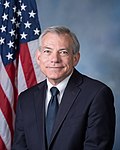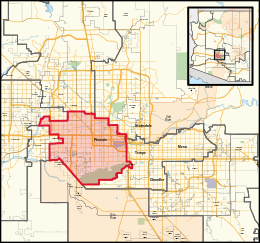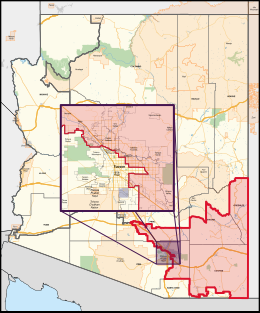United States congressional delegations from Arizona
From Wikipedia, the free encyclopedia
Since Arizona became a U.S. state in 1912,[1] it has sent congressional delegations to the United States Senate and United States House of Representatives, beginning with the 63rd United States Congress in 1913.[2] Before becoming a state, the Arizona Territory elected a non-voting delegate at-large to Congress from 1864 to 1912.[2] Each state elects two senators to serve for six years, and varying numbers of members of the House, depending on state population, to two-year terms.[3] Arizona has sent nine members to the House in each delegation since the 2010 United States Census.[4]

A total of 59 people have served Arizona in the House and 15 have served Arizona in the Senate. The first woman to serve Arizona in the House was Isabella Greenway.[5] Seven women have served Arizona in the House, including Kyrsten Sinema and Martha McSally, who also served Arizona in the Senate, the only women to do so.[6]
Carl Hayden was Arizona's longest-serving senator, and his 56 years as a senator is the sixth-longest tenure in American history.[6]
Current delegation
Summarize
Perspective
Arizona
|
Class I senator | Class III senator | ||
|---|---|---|---|---|
 Ruben Gallego (Junior senator) (Phoenix) |
 Mark Kelly (Senior senator) (Tucson) | |||
| Party | Democratic | Democratic | ||
| Incumbent since[9] | January 3, 2025 | December 2, 2020 |
Arizona's current congressional delegation in the 118th Congress consists of its two senators, one Democrat and one independent,[7] and its nine representatives, six Republicans, two Democrats, and one vacancy.[10]
The current deans, or longest-serving members, of the Arizona delegation are Republican Representatives David Schweikert of the 1st district and Paul Gosar of the 9th district, who have served in the House since 2011.
As of 2022, the Cook Partisan Voting Index, a measure of how strongly partisan a state is,[11] ranked Arizona's 1st, 5th, 8th, and 9th districts as leaning Republican, and the 2nd, 3rd, 4th, 6th, and 7th districts as leaning Democratic.[12] As a state, Arizona is ranked as leaning Republican, with a score of R+2.[13]
| District | Member (Residence)[15] |
Party | Incumbent since | CPVI (2022)[12] |
District map |
|---|---|---|---|---|---|
| 1st |  David Schweikert (Fountain Hills) |
Republican | January 3, 2011[16] | R+2 |  |
| 2nd |  Eli Crane (Oro Valley) |
Republican | January 3, 2023[17] | R+6 |  |
| 3rd |  Yassamin Ansari (Phoenix) |
Democratic | January 3, 2025 | D+24 |  |
| 4th |  Greg Stanton (Phoenix) |
Democratic | January 3, 2019[18] | D+2 |  |
| 5th |  Andy Biggs (Gilbert) |
Republican | January 3, 2017[19] | R+11 |  |
| 6th |  Juan Ciscomani (Tucson) |
Republican | January 3, 2023[20] | R+3 |  |
| 7th | Vacant |
March 13, 2025 | D+15 |  | |
| 8th |  Abraham Hamadeh (Scottsdale) |
Republican | January 3, 2025 | R+10 |  |
| 9th |  Paul Gosar (Bullhead City) |
Republican | January 3, 2011[21] | R+16 |  |
United States Senate
Summarize
Perspective
Since it became a state in 1912,[1] 14 people have served as a U.S. senator from Arizona. Of those, Martha McSally and Kyrsten Sinema have been the only women.[6] Sinema is also the first openly bisexual member of Congress.[22] Both senators Barry Goldwater and John McCain have been nominated as the Republican candidate for president, in 1964 and 2008 respectively.[23][24]
Sometimes considered a swing state,[25] elections in Arizona are considered critical for party control of the Senate.[26] Senators are elected every six years depending on their class, with each senator serving a six-year term, and elections for senators occurring every two years, rotating through each class such that in each election, around one-third of the seats in the Senate are up for election.[27] Arizona's senators are elected in classes I and III.[28] Currently, Arizona is represented in the Senate by Ruben Gallego and Mark Kelly.[29]




Democratic (D) Independent (I) Republican (R)
| Class I senator | Congress | Class III senator | ||
|---|---|---|---|---|
| Henry F. Ashurst (D) | 62nd (1912–1913) | Marcus A. Smith (D) | ||
| 63rd (1913–1915) | ||||
| 64th (1915–1917) | ||||
| 65th (1917–1919) | ||||
| 66th (1919–1921) | ||||
| 67th (1921–1923) | Ralph H. Cameron (R) | |||
| 68th (1923–1925) | ||||
| 69th (1925–1927) | ||||
| 70th (1927–1929) | Carl Hayden (D) | |||
| 71st (1929–1931) | ||||
| 72nd (1931–1933) | ||||
| 73rd (1933–1935) | ||||
| 74th (1935–1937) | ||||
| 75th (1937–1939) | ||||
| 76th (1939–1941) | ||||
| Ernest McFarland (D) | 77th (1941–1943) | |||
| 78th (1943–1945) | ||||
| 79th (1945–1947) | ||||
| 80th (1947–1949) | ||||
| 81st (1949–1951) | ||||
| 82nd (1951–1953) | ||||
| Barry Goldwater (R) | 83rd (1953–1955) | |||
| 84th (1955–1957) | ||||
| 85th (1957–1959) | ||||
| 86th (1959–1961) | ||||
| 87th (1961–1963) | ||||
| 88th (1963–1965) | ||||
| Paul Fannin (R) | 89th (1965–1967) | |||
| 90th (1967–1969) | ||||
| 91st (1969–1971) | Barry Goldwater (R) | |||
| 92nd (1971–1973) | ||||
| 93rd (1973–1975) | ||||
| 94th (1975–1977) | ||||
| Dennis DeConcini (D) | 95th (1977–1979) | |||
| 96th (1979–1981) | ||||
| 97th (1981–1983) | ||||
| 98th (1983–1985) | ||||
| 99th (1985–1987) | ||||
| 100th (1987–1989) | John McCain (R)[a] | |||
| 101st (1989–1991) | ||||
| 102nd (1991–1993) | ||||
| 103rd (1993–1995) | ||||
| Jon Kyl (R) | 104th (1995–1997) | |||
| 105th (1997–1999) | ||||
| 106th (1999–2001) | ||||
| 107th (2001–2003) | ||||
| 108th (2003–2005) | ||||
| 109th (2005–2007) | ||||
| 110th (2007–2009) | ||||
| 111th (2009–2011) | ||||
| 112th (2011–2013) | ||||
| Jeff Flake (R) | 113th (2013–2015) | |||
| 114th (2015–2017) | ||||
| 115th (2017–2019) | ||||
| Jon Kyl (R)[b] | ||||
| Kyrsten Sinema (D) | 116th (2019–2021) | Martha McSally (R) | ||
| Mark Kelly (D) | ||||
| 117th (2021–2023) | ||||
| Kyrsten Sinema (I)[c] | ||||
| 118th (2023–2025) | ||||
| Ruben Gallego (D) | 119th (2025–2027) | |||
United States House of Representatives
Summarize
Perspective
Arizona has had numerous notable representatives in Congress, including Stewart Udall, who resigned to serve as the Secretary of the Interior in the Kennedy administration,[34] his brother, Mo Udall, who came in second in the 1976 Democratic Party presidential primaries,[35] and John Jacob Rhodes, who served as House Minority Leader for the Republican Party during the Watergate scandal.[36]
Each district uses a popular vote to elect a member of Arizona's delegation in the House of Representatives.[37] Districts are redrawn every ten years, after data from the US Census is collected.[38] From 1863 to 1912, Arizona sent a non-voting delegate to the House of Representatives; when it became a state in 1912, it had one seat in the House.[2] Since then, its representation in the House has grown along with its population. Since 2013, Arizona has had nine congressional districts drawn according to the results of the 2010 United States Census.[39]



1863–1912: 1 non-voting delegate
Starting on December 5, 1864, Arizona Territory sent a non-voting delegate to the House.[2]
Democratic (D) Independent (I) Republican (R) Unionist (U)
| Congress | Delegate from Territory's at-large district |
|---|---|
| 38th (1863–1865) | Charles Debrille Poston (R) |
| 39th (1865–1867) | John N. Goodwin (R) |
| 40th (1867–1869) | Coles Bashford (I) |
| 41st (1869–1871) | Richard C. McCormick (U) |
| 42nd (1871–1873) | |
| 43rd (1873–1875) | |
| 44th (1875–1877) | Hiram Sanford Stevens (D) |
| 45th (1877–1879) | |
| 46th (1879–1881) | John G. Campbell (D) |
| 47th (1881–1883) | G. H. Oury (D) |
| 48th (1883–1885) | |
| 49th (1885–1887) | Curtis Coe Bean (R) |
| 50th (1887–1889) | Marcus A. Smith (D) |
| 51st (1889–1891) | |
| 52nd (1891–1893) | |
| 53rd (1893–1895) | |
| 54th (1895–1897) | Oakes Murphy (R) |
| 55th (1897–1899) | Marcus A. Smith (D) |
| 56th (1899–1901) | John Frank Wilson (D) |
| 57th (1901–1903) | Marcus A. Smith (D) |
| 58th (1903–1905) | John Frank Wilson (D) |
| 59th (1905–1907) | Marcus A. Smith (D) |
| 60th (1907–1909) | |
| 61st (1909–1911) | Ralph H. Cameron (R) |
| 62nd (1911–1912) |
1912–1943: 1 seat
Following statehood on February 14, 1912,[1] Arizona had one seat in the House.[42]
Democratic (D)
| Congress | At-large district |
|---|---|
| 62nd (1912–1913) | Carl Hayden (D) |
| 63rd (1913–1915) | |
| 64th (1915–1917) | |
| 65th (1917–1919) | |
| 66th (1919–1921) | |
| 67th (1921–1923) | |
| 68th (1923–1925) | |
| 69th (1925–1927) | |
| 70th (1927–1929) | Lewis Douglas (D)[d] |
| 71st (1929–1931) | |
| 72nd (1931–1933) | |
| 73rd (1933–1935) | Isabella Greenway (D) |
| 74th (1935–1937) | |
| 75th (1937–1939) | John R. Murdock (D) |
| 76th (1939–1941) | |
| 77th (1941–1943) |
1943–1963: 2 seats
Following the 1940 census, Arizona was apportioned two seats.[42] For six years, the seats were elected statewide on a general ticket. In 1949, districts were used.[44]
Democratic (D) Republican (R)
| Congress | 2 seats elected on a general ticket | |
|---|---|---|
| 1st seat | 2nd seat | |
| 78th (1943–1945) | John R. Murdock (D) | Richard F. Harless (D) |
| 79th (1945–1947) | ||
| 80th (1947–1949) | ||
| Congress | 1st district | 2nd district |
| 81st (1949–1951) | John R. Murdock (D) | Harold Patten (D) |
| 82nd (1951–1953) | ||
| 83rd (1953–1955) | John Jacob Rhodes (R) | |
| 84th (1955–1957) | Stewart Udall (D)[e] | |
| 85th (1957–1959) | ||
| 86th (1959–1961) | ||
| 87th (1961–1963) | ||
| Mo Udall (D) | ||
1963–1973: 3 seats
Following the 1960 census, Arizona was apportioned three seats.[42]
Democratic (D) Republican (R)
| Congress | District | ||
|---|---|---|---|
| 1st | 2nd | 3rd | |
| 88th (1963–1965) | John Jacob Rhodes (R) |
Mo Udall (D) | George F. Senner Jr. (D) |
| 89th (1965–1967) | |||
| 90th (1967–1969) | Sam Steiger (R) | ||
| 91st (1969–1971) | |||
| 92nd (1971–1973) | |||
1973–1983: 4 seats
Following the 1970 census, Arizona was apportioned four seats.[42]
Democratic (D) Republican (R)
| Congress | District | |||
|---|---|---|---|---|
| 1st | 2nd | 3rd | 4th | |
| 93rd (1973–1975) | John Jacob Rhodes (R) |
Mo Udall (D) | Sam Steiger (R) | John Conlan (R) |
| 94th (1975–1977) | ||||
| 95th (1977–1979) | Bob Stump (D) | Eldon Rudd (R) | ||
| 96th (1979–1981) | ||||
| 97th (1981–1983) | ||||
| Bob Stump (R) | ||||
1983–1993: 5 seats
Following the 1980 census, Arizona was apportioned five seats.[42]
Democratic (D) Republican (R)
| Congress | District | ||||
|---|---|---|---|---|---|
| 1st | 2nd | 3rd | 4th | 5th | |
| 98th (1983–1985) | John McCain (R) | Mo Udall (D)[f] | Bob Stump (R) | Eldon Rudd (R) | Jim McNulty (D) |
| 99th (1985–1987) | Jim Kolbe (R) | ||||
| 100th (1987–1989) | Jay Rhodes (R) | Jon Kyl (R) | |||
| 101st (1989–1991) | |||||
| 102nd (1991–1993) | |||||
| Ed Pastor (D) | |||||
1993–2003: 6 seats
Following the 1990 census, Arizona was apportioned six seats.[42]
Democratic (D) Republican (R)
| Congress | District | |||||
|---|---|---|---|---|---|---|
| 1st | 2nd | 3rd | 4th | 5th | 6th | |
| 103rd (1993–1995) | Sam Coppersmith (D) | Ed Pastor (D) |
Bob Stump (R) |
Jon Kyl (R) | Jim Kolbe (R) |
Karan English (D) |
| 104th (1995–1997) | Matt Salmon (R) | John Shadegg (R) |
J. D. Hayworth (R) | |||
| 105th (1997–1999) | ||||||
| 106th (1999–2001) | ||||||
| 107th (2001–2003) | Jeff Flake (R) | |||||
2003–2013: 8 seats
Following the 2000 census, Arizona was apportioned eight seats.[42]
Democratic (D) Republican (R)
| Congress | District | |||||||
|---|---|---|---|---|---|---|---|---|
| 1st | 2nd | 3rd | 4th | 5th | 6th | 7th | 8th | |
| 108th (2003–2005) | Rick Renzi (R) | Trent Franks (R) |
John Shadegg (R) |
Ed Pastor (D) |
J. D. Hayworth (R) | Jeff Flake (R) |
Raúl Grijalva (D) |
Jim Kolbe (R) |
| 109th (2005–2007) | ||||||||
| 110th (2007–2009) | Harry Mitchell (D) | Gabby Giffords (D)[g] | ||||||
| 111th (2009–2011) | Ann Kirkpatrick (D) | |||||||
| 112th (2011–2013) | Paul Gosar (R) | Ben Quayle (R) | David Schweikert (R) | |||||
| Ron Barber (D) | ||||||||
2013–present: 9 seats
Since the 2010 census, Arizona has been apportioned nine seats.[42]
Democratic (D) Republican (R)
| Congress | District | ||||||||
|---|---|---|---|---|---|---|---|---|---|
| 1st | 2nd | 3rd | 4th | 5th | 6th | 7th | 8th | 9th | |
| 113th (2013–2015) | Ann Kirkpatrick (D) |
Ron Barber (D) | Raúl Grijalva (D) |
Paul Gosar (R) |
Matt Salmon (R) |
David Schweikert (R) |
Ed Pastor (D) | Trent Franks (R)[h] |
Kyrsten Sinema (D) |
| 114th (2015–2017) | Martha McSally (R) |
Ruben Gallego (D) | |||||||
| 115th (2017–2019) | Tom O'Halleran (D) |
Andy Biggs (R) | |||||||
| Debbie Lesko (R) | |||||||||
| 116th (2019–2021) | Ann Kirkpatrick (D) |
Greg Stanton (D) | |||||||
| 117th (2021–2023) | |||||||||
| 118th (2023–2025) | David Schweikert (R) |
Eli Crane (R) | Ruben Gallego (D) |
Greg Stanton (D) |
Juan Ciscomani (R) |
Raúl Grijalva (D) |
Paul Gosar (R) | ||
| 119th (2025–2027) | Yassamin Ansari (D) |
Abraham Hamadeh (R) | |||||||
| vacant | |||||||||
See also
Notes
- Senator McCain died in office.[31]
- Senator Kyl was appointed by governor Doug Ducey to fill the seat of John McCain after McCain's death in office. Kyl resigned at the end of 2018.[32]
- Senator Sinema left the Democratic Party to become an Independent in 2022.[33]
- Representative Douglas resigned to become the Director of the Bureau of the Budget.[43]
- Representative Stewart Udall resigned to become the Secretary of the Interior in the Kennedy cabinet.[34]
- Representative Mo Udall resigned due to the effects of Parkinson's disease.[45]
- Representative Giffords resigned to recover from the assassination attempt against her in the 2011 Tucson shooting.[41]
- Representative Franks resigned from the House after a House Ethics Committee investigation was opened into allegations against him for sexual assault.[46]
References
Wikiwand - on
Seamless Wikipedia browsing. On steroids.
